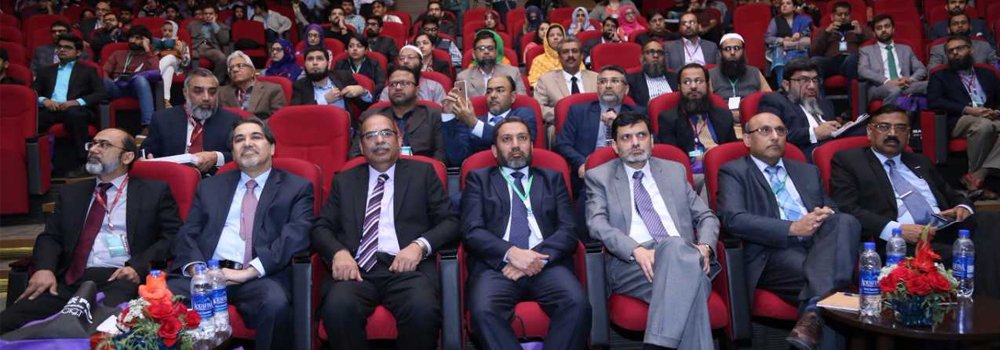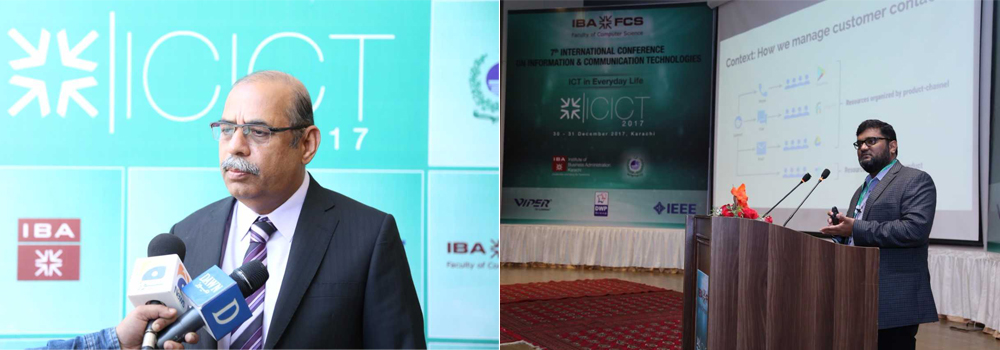
December 30 - 31: The 7th International Conference on Information
and Communications Technologies (ICICT), was held successfully by
the Institute of Business Administration (IBA) at its City Campus.
The event was attended by over 300 participants, including delegates
from around the world, policy makers, faculty members, researchers,
industry leaders, and students. HEC and IEEE were the key partners
for this conference.
Dr. Farrukh Iqbal, Dean and Director IBA, welcomed the audience and
highlighted the long standing nature of the conference, which was
initiated in 2005 and is held once every two years. Enunciating the
merits of the conference, Dr. Farrukh Iqbal said, "The papers for
this conference came from five different continents, which shows the
recognition of this conference at an international level." He also
emphasized that only one third of the papers were accepted after a
thorough review process conducted by the technical committee,
comprising of senior researchers from across Pakistan and around the
world. Out of a total of 114 papers 30% were finally accepted with 34 papers being part of the IEEE Proceedings.
Next, the Chief Guest Dr. Arshad Ali, Executive Director HEC,
addressed the audience about the importance of ICT in everyday life,
which was the theme of this year's conference. Dr. Arshad stated
that, "As a nation, we need to develop indigenous technologies,
solutions and devices to solve the local problems. And the young
talent and innovators that are designing new technological solutions
should be recognized and rewarded on forums like this conference to
encourage and motivate further advancement in technology".
Furthermore, he mentioned that the role of a teacher has shifted
from leader to facilitator in an ICT based education system and that
besides education, many other fields have also advanced using ICT.
The first keynote was a discussion on the power of analytical
culture by Dr. Zubair Anwar, Head of Analytics, Consumer Support
Google, USA. Dr. Zubair explained how breeding a culture of
analytical activities in an organization should be an integral part
of an analytical/big data initiative. Dr. Zubair also highlighted
the 3 main principles that make Google an outstanding organization;
'Focus on the user experience', 'Freedom to challenge each other's
ideas openly and 'To be resourceful'. He also conducted an engaging
workshop to demonstrate some critical examples of this
culture-breeding activity in Google. The conference hosted a
workshop on identity federation, focusing on using digital identity
and storage mechanism in an efficient manner.
The conference included several more keynote sessions and sessions
from invited speakers. These sessions covered a variety of topics
including digital intelligence, wireless sensor networks, machine
learning in medicine and connected vehicle technology. The talks
were conducted by academics from renowned universities in and
outside Pakistan.
The paper presentations included viable work done in the fields of
Speech, Image and Vision Systems, Networks and Computer Security,
Software and Information Systems, Artificial Intelligence,
Information Retrieval, ICT and Society. This year, other than
presentation tracks, there was a Doctoral Consortium session in
which students enrolled in PhD programs presented their ideas and
work and received feedback from mentors in relevant areas from
different universities. ICICT 2017 remained a successful platform to
encourage research and collaborative efforts between the academia
and industry.
